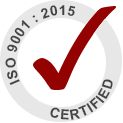NICKEL VANADIUM ETCHANT NiV 28-23
DESCRIPTION:
Transene Thin Film Nickel Vanadium Etchant NiV 28-23 is a high-purity nitrate-based formulation for superior etching of evaporated nickel-vanadium alloy. NiV 28-23 is compatible with both positive and negative photoresist materials. Recommended resists include AZ-111, AZ-1350 OH, and KMER. NiV 28-23 etchant meets SEMI grade standards and is filtered to 0.2 micron.
PROPERTIES OF TRANSENE NICKEL VANADIUM ETCHANT NiV 28-23
| How do I increase the etch rate? | 1. The rate will approximately double with every 10°C increase in temperature. 2. Increase the rate of stirring or agitation. |
| How do I reduce the etch rate? | Adding 1 part deionized water to 2 parts etchant will reduce the etch rate approximately 50%. |
| Do I need to dilute the etchant? | No, it is ready to use. |
| How do I reduce undercutting? | Increase the rate of stirring or agitation. |
| Appearance | Light yellow |
| pH | Strong acid |
| Etch Rate at 25°C | 25-35 Å/sec. |
| Etch Capacity (rate declines at ~70%) | 100 g/gallon |
| Shelf Life | 1 year |
| Storage Conditions | Avoid freezing |
| Filtration | 1 um |
| Recommended Operating Temperatures | 20-80oC (30-40oC most common) |
| Rinse | Deionized water |
| Photoresist Recommendations | KLT6000 Series, KLT 5300 Series, HARE SQ (SU-8 type), TRANSIST, or PKP-308PI |
| Select Compatible Materials | GaAs, Au, Cu (most applications), glass, alumina, nitride
See https://transene.com/etch-compatibility/ for more details. |
| Select Incompatible Materials | Al, Ag |
| Compatible Plastics | HDPE, PP, Teflon, PFA, PVC |
| Country of Origin | USA |
| Availability | 1-2 days |
| Available Sizes | Quart, Gallon, 5 Gallon, 55 Gallon |
| Packaging | HDPE |
| Packing | 4 gallons/case |
| Isotropy | Isotropic |
| Incompatible Chemicals | Strong bases |
| Additional Information | Etches impure nickel such as NiV |
APPLICATION:
Nickel Vanadium Etchant NiV 28-23 is supplied ready-to-use as an immersion type etchant. Etch rates may be controlled via operating temperature. Actual etch is related to film thickness, alloy makeup, density, and operating temperature but is typically approximately one minute for evaporative deposits. Etching should be followed with a deionized water rinse.

